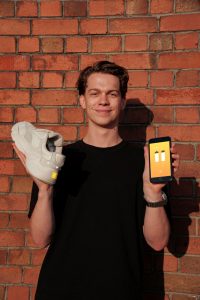We’ve all been there. You’re on a train, lost trying to navigate, or FaceTiming a friend and… your phone dies.
What do you do if you have no way of charging it? Alex Witty, a University of Brighton alum has the answer: The Piezo Project. The Piezo Project is a renewable energy technology that when integrated into footwear, harnesses the power generated by your footsteps to provide charge for your mobile device while you’re on the move.
Having started his first company, Witty Ltd in July 2019, and filing his first patent in May 2020, we wanted to catch up with Alex to see what the last two years have had in store for him and his impressive project.
Alex celebrated his graduation from Product Design with Professional Experience BSc(Hons) earlier this month, during a windy week in Brighton. The celebration of his degree seemed like a well-deserved break after finishing his course back in July 2021. “I picked up work on The Piezo Project straight after finishing my course and spent months getting involved in funding networks and entrepreneurial hubs in Bath, where I’m based,” he said.
Alex has certainly put in the leg work to get his company to the position it’s in today.
“There was a lot of work that went into securing the patent for my project towards the end of my course; credit and testament to beepurple at the University of Brighton for putting me in touch with the right people to get it done. I was delighted to have that patent approved and the support I received really did help me get it over the line. Since then, I’ve been able to get brand exposure, secure additional funding and begin working on prototype shoes. It’s subsequently enabled me to collaborate with Bath University’s engineering department to co-develop the engineering in the shoe.”
For Alex, his desire at the end of this year is to have a pair of shoes that do exactly what they say on the tin: harness energy created by footsteps in order to charge a mobile phone. And, if anyone can do it, Alex certainly can. Despite starting his company in the midst of a global pandemic, the project didn’t take a backseat. During lockdown, the recent graduate spent time focusing on the theory behind the project, ensuring the foundations of his design were strong. He said, “I wanted to make sure that when it came to prototyping, the funds I received would be used in the best way possible to support the project. I’m really excited that this year will be the year I am able to get the prototype together.”
During his time at the University of Brighton, Alex received the Santander Universities Growth Grant and the Professor Fred Maillardet Breakthrough Award to support his product and idea development. This funding played a vital role in helping Alex get the traction he needed to build on his idea. “Product aside, to have the funders behind the Santander Universities Growth Grant and The Breakthrough Award instil such confidence in my work has been a hugely important aspect of this process. That validation from funding bodies and academics was everything for me at the start. Having that backing was incredibly important. During lockdown I felt like I was trying to achieve something really crazy. I kept thinking: I’m sat here in my room, in lockdown, and I’m trying to make energy harvesting shoes out of all these different crystals. When you boil it down it seems very strange. So to have the validation that there’s potential there is fantastic and incredibly reassuring.”
But the funds haven’t just helped Alex develop his project financially. They’ve kick-started his career and given him a taste of external funding and the opportunities available as a creative entrepreneur. It’s clear from speaking to him that these funds have provided so much more than financial backing, they’ve given him a career path and the chance to explore the entrepreneurial creative space he’s working in.
He said, “What’s wonderful about this project is how it could change the way we create energy at a time when we are reaching to be carbon neutral by 2030. We can utilise the energy that we output, and we should. To me that screams for radical innovation: could we be fully self-sufficient, could we be our own electrical grids? Developing and harnessing some form of self-sufficient energy through The Piezo Project is an amazing start; everyone is in the mood to look for renewable energy.”
And Alex’s innovation seems like the best way to walk, if not run, towards that goal.
To find out more about The Piezo Project and Alex Witty’s creative endeavours, visit his website here: The Piezo Project.

